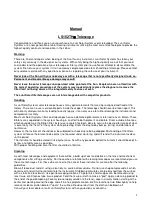
12
Looking at or near the
Sun
will cause
irreversable
damage to your eye. Do not point
this telescope at or near the Sun. Do not look through the telescope as it is moving.
CALCULATE MAGNIFICATION
The magnification, or power of a telescope is determined by two factors: the focal
length of the eyepiece and the focal length of the telescope. Your telescope is sup-
plied with one eyepiece. The focal length of the eyepiece, 26mm, is printed on its side.
Telescope focal length is the distance that light travels inside the telescope before
reaching a focus.
The focal length of the Dobsonian 8" = 1219mm.
The focal length of the Dobsonian 10" = 1270mm
The focal length of the Dobsonian 12" = 1524mm
The focal length of the Dobsonian 16" = 1829mm
To change magnification, change eyepieces.
To calculate the magnification of a given eyepiece, use this formula:
Power = Telescope Focal Length ÷ Eyepiece Focal Length
Example: Using the 26mm eyepiece supplied with the 8" f/6, the power is:
Power = 1219mm ÷ 26mm = 47mm
The type of eyepiece, whether Modified Achromatic, Plössl, or Super Plössl, has no
effect on magnification, but does have a bearing on such optical characteristics as
field of view, flatness of field, and color correction.
Maximum practical magnification is about 50X per inch of aperture. Generally, how-
ever, lower powers produce higher image resolution. When unsteady air conditions
prevail (as witnessed by rapid “twinkling” of the stars), extremely high powers result in
distorted magnification and observational details are diminished by the use of
excessive power.
When beginning observations on a particular object, always start with a low power
eyepiece. Centered the object in the field of view. Sharply focus the object. Then try
using a higher power eyepiece. If the image starts to become fuzzy when you use
higher magnification, back down to a lower power. The atmosphere is not sufficiently
steady to support high powers. Keep in mind that a bright, clearly resolved, but
smaller image will show far more detail than a dimmer, poorly resolved larger image.
OBSERVING
Observe during the daytime:
Try out your telescope during the daytime at first. It is
easier to learn how it operates and how to observe when it is light.
Pick out an easy object to observe:
A distant mountain, a large tree, a lighthouse or
skyscraper make excellent targets. Point the optical tube so it lines up with your
object.
Use the red dot finder:
If you have not done so, align the red dot finder with the
telescope’s eyepiece as described earlier. Look through the finder until you can see
the object. It will be easier to locate an object using the finder rather than locating with
the eyepiece. Line up the object with the finder’s red dot.
Look through the eyepiece:
Once you have the object lined up in the finder, look
through the optical tube’s eyepiece. If you have aligned your finder, you will you see
the object in your eyepiece.
Focus:
Look through the eyepiece and practice focusing on the object you have
chosen. The focuser has both a lock knob and a tension adjustment knob. The first
lock prevents the draw tube (16) from moving in and out. The second lock locks the
focuser knob, thereby locking a focus position into place. Experiment with these knobs
to discover which adjustments are comfortable with your viewing style.
Observe the Moon:
When you feel comfortable with the finder, the eyepieces, the
locks and the adjustment controls, you will be ready to try out the telescope at night.
The Moon is the best object to observe the first time you go out at night. Pick a night
when the Moon is a crescent. No shadows are seen during a full Moon, making it
appear flat and uninteresting.
Summary of Contents for LightBridge
Page 1: ...Instruction Manual 8 10 12 16 LightBridge Truss Tube Dobsonian Telescopes MEADE COM...
Page 22: ......
Page 23: ......










































